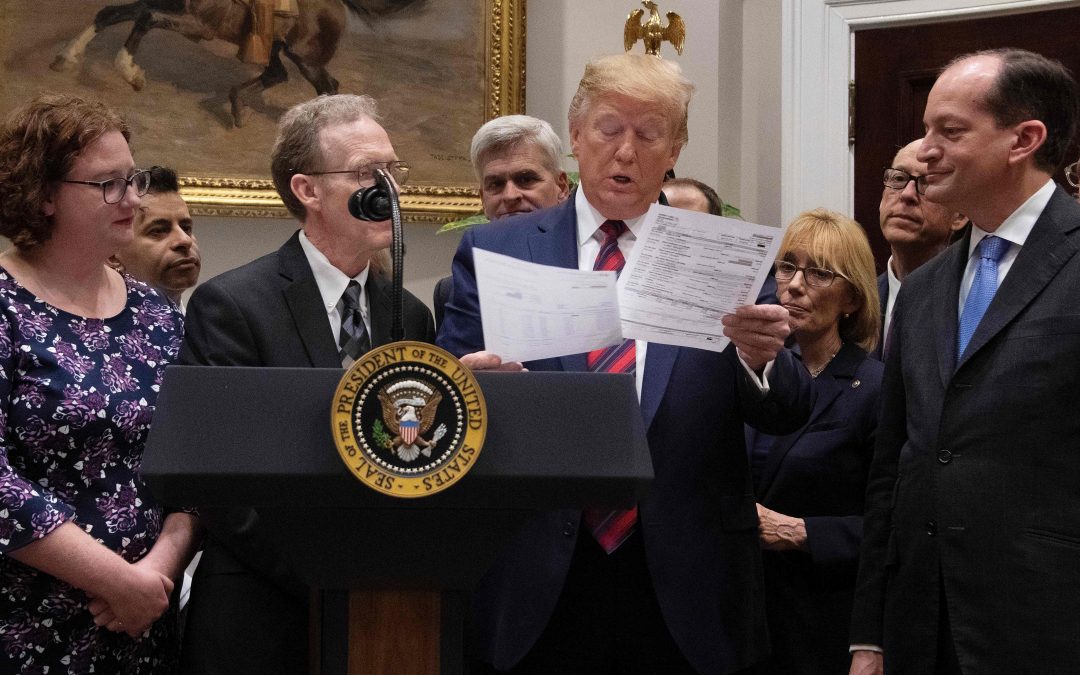At a Press Conference on May 9, 2019 President Trump stated that he was going to do something about healthcare and medical billing. The President: “We’re determined to end surprise medical billing for American patients.”
It’s the beginning of a plan of transparency. Washington has begun a bold initiative to reduce the price of prescription drugs. In 2018 drug prices saw their first decline in 46 years. Trump’s plan may allow states to buy drugs in other countries if they can buy them for a lesser price – 40, 50 or even 60% less. Plans are to protect patients with preexisting conditions, very importantly. For the first time in history the administration is going to hold insurance companies and hospitals totally accountable. How will they be held accountable under the planned legislation?
In emergency care situations, patients should never have to bear the burden of out-of-network costs they didn’t agree to pay. Balance billing will be prohibited for emergency care.
For scheduled, non-emergency care, patients should be given a clear and honest bill upfront. That means they must be given prices for all services and out-of-pocket payments for which they will be responsible. This may help eliminate surprise charges and empowers a patient to choose the best option at the lowest possible price.
Patients should not receive surprise bills from out-of-network providers that they did not choose themselves.
Legislation should lead to greater competition from hospitals and insurance companies. Patients should be in charge and have total control of their healthcare.
The medical billing process in the United States is broken. Around the country, millions of Americans are struggling with medical billing problems ranging from inaccurate charges to surprise fees to wrongly denied claims.
Many of them have given up on trying to fight their medical bill errors and surprise fees. The process is exhausting and confusing. Medical bills are filled with special terms and lack clarity about whether you or your insurance provider is responsible for payment.
Consumer Reports recently performed a study in which one-third of respondents indicated they had paid a medical bill of $1,000 or more that they were not sure that they owed. People gave reasons for giving up as the bill was confusing and they didn’t understand the medical billing system.
The complex medical coding system itself has problems and can result in billing errors. Each diagnosis or procedure has its own alphanumeric code (ICD) to quality for reimbursement by insurers. A wrong code results in a rejected claim.
Neither insurers nor providers have an incentive to change the system. The additional expenses are passed on to the consumer in the form of higher premiums and out-of-pocket payments.
In the interim while Washington is in their meetings and having press conferences “laying out their plans,” Americans continue with the struggle of surprise medical bills. Hammered and nailed by medical bills from hospitals and healthcare providers who may have contributed to their care. What is an immediate plan of action for YOU while Washington works on policies? Take these immediate steps to help you stay out of bankruptcy and take control of your medical bills. Educate yourself and take your “power as a patient” back.
What can you do?
- Call your insurance company and request a full copy of your insurance policy.
- If you have insurance through your employer, call your Human Resources (HR) department and ask what your insurance will pay for.
- Ask about pre-existing conditions.
- Confirm your maximum out-of-pocket for individual, and total annual out-of-pocket for your policy.
- Request your insurance company to provide you with a copy of the MIB report from your file, or purchase a copy of your MIB report at www.mib.com.
What is MIB?
MIB Group, Inc. is a U.S. and Canadian organization that was formed in 1902. Its underwriting services are used by life and health insurance companies to assess an individual’s risk and eligibility during the underwriting of life, health, disability income, critical illness, and long-term care insurance policies. Supposedly, MIB may help lower the cost of life and health insurance for consumers. Remember, the MIB report is used by your insurance company underwriter; you do not have any control over your insurance policy costs.
Remember, YOU are stronger than a big stack of medical bills!
Photo Credit: US President Donald Trump (C) looks at a medical bill as he speaks during event on ending surprise medical billing at the White House in Washington, DC, on May 9, 2019. – Trump called on lawmakers to pass legislation protecting Americans from surprise medical bills incurred after patients receive care outside their health plans network. (Photo Credit JIM WATSON/AFP/Getty Images)


Sometimes I think the Bill’s are stronger, the stack of papers (Bill’s) are so large we can’t lift them, it isnredicous, we definitely fit inthe criteria of unknown surprise charges, thisnsustem is out of control, Americans are being over billed, scammed and ripped off it hasntonstop and maybe Trump is the one to do it.. Thank you for the blog, it definitely opens eyes and makes you stand up and think about all this. Mary recently had a cat scan that’s all it was thousands of dollars why?? Who knows can’t really understand or read the bill.